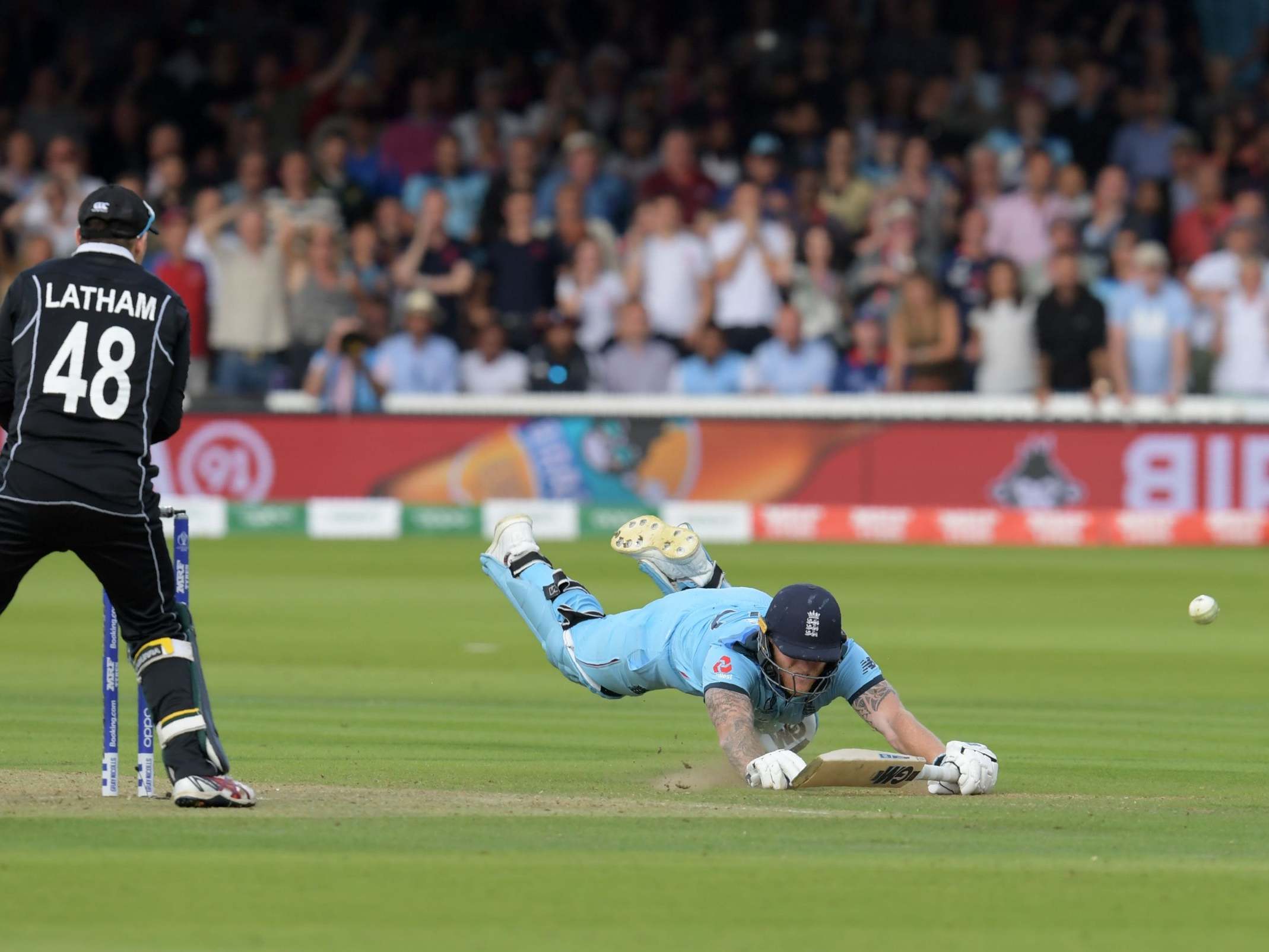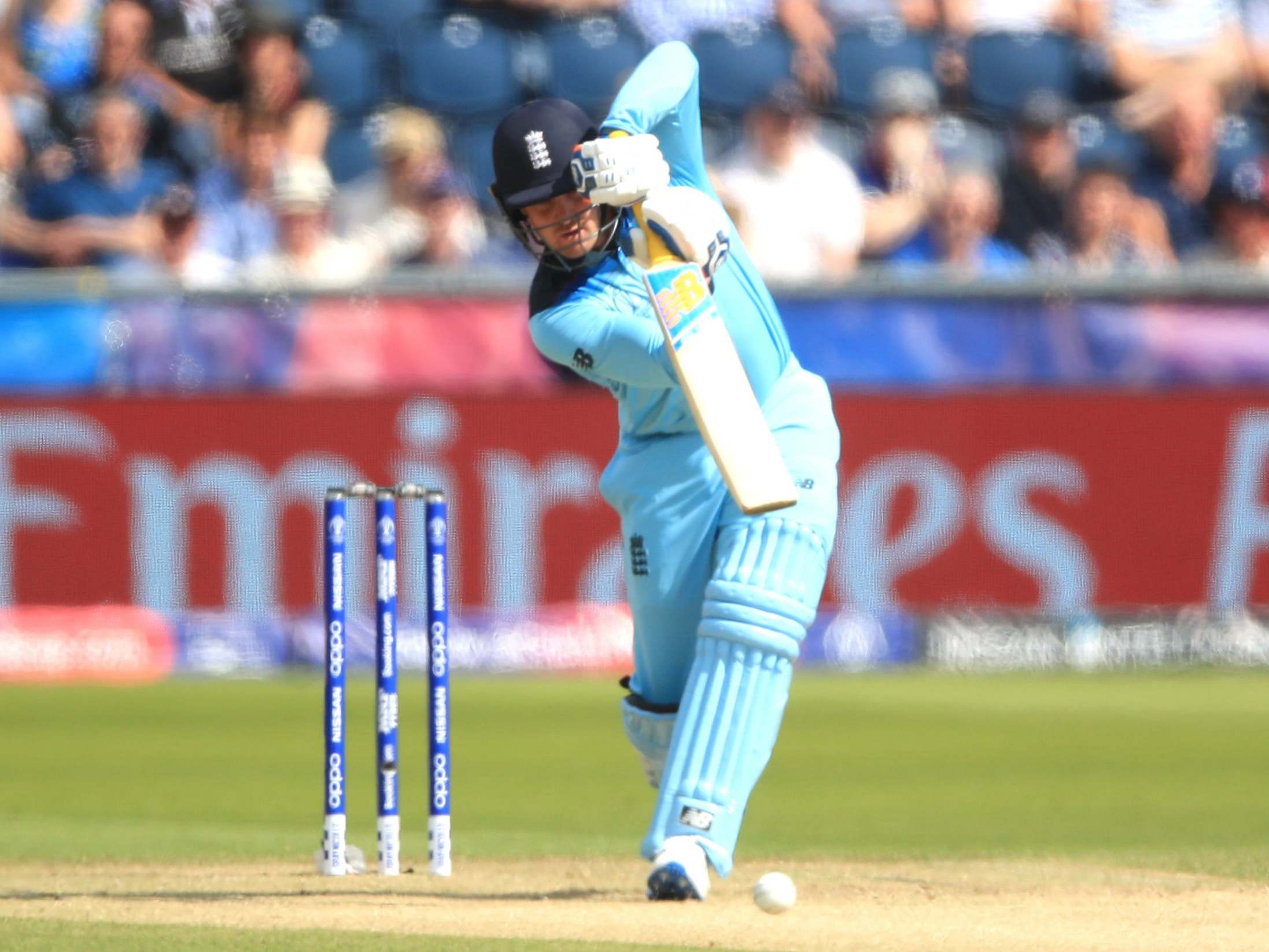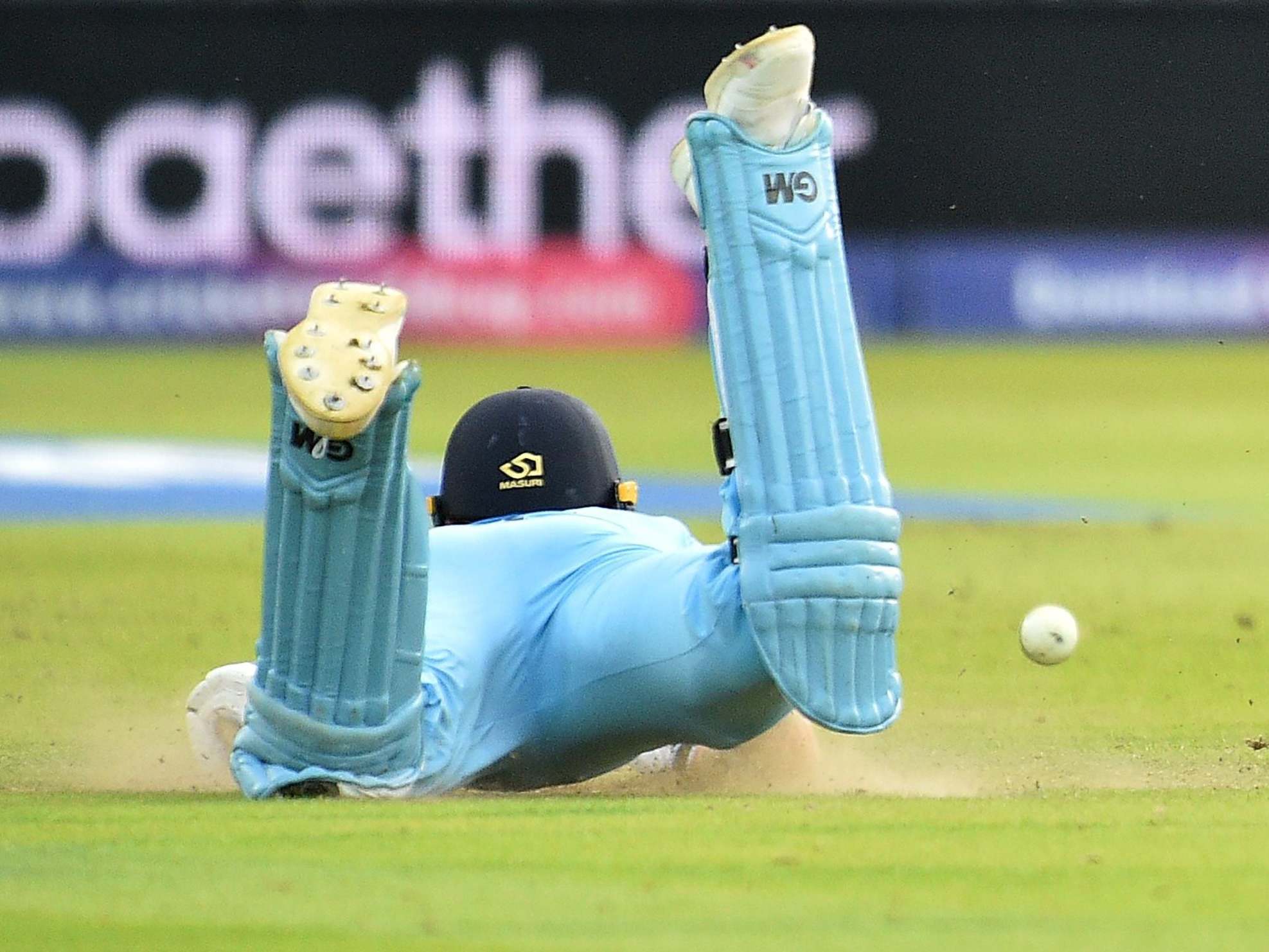Ben Stokes, that deflection and the question of what is luck in sport?
How can you make sense out of something that has never happened, never been experienced or never been explained before?

Your support helps us to tell the story
From reproductive rights to climate change to Big Tech, The Independent is on the ground when the story is developing. Whether it's investigating the financials of Elon Musk's pro-Trump PAC or producing our latest documentary, 'The A Word', which shines a light on the American women fighting for reproductive rights, we know how important it is to parse out the facts from the messaging.
At such a critical moment in US history, we need reporters on the ground. Your donation allows us to keep sending journalists to speak to both sides of the story.
The Independent is trusted by Americans across the entire political spectrum. And unlike many other quality news outlets, we choose not to lock Americans out of our reporting and analysis with paywalls. We believe quality journalism should be available to everyone, paid for by those who can afford it.
Your support makes all the difference.A butterfly flaps its wings in San Francisco, and a traffic policeman feels just the faintest chill on the back of his neck in Tokyo, and a mangrove sighs in the breeze in Madagascar, and a cigarette flicked from the fourth floor of an apartment block narrowly misses the back wheel of a passing cyclist in Amsterdam, and at Lord’s a cricket ball arcs through the air and lands on a cricket bat and ricochets away in the only direction that will send it unimpeded towards the boundary.
Was that what happened? Well, it seems as good an explanation as any. Given unlimited time, unlimited resources and unlimited co-operation, I suppose you could concoct a more scientific explanation of the deflection that won England the Cricket World Cup last Sunday: some combination of the tension in Martin Guptill’s shoulder as he hurled the ball in, the friction of the Lord’s turf, the geometry of Ben Stokes’s dive, the speed of the outfield, the anticipation and positioning of the New Zealand fielders - notice how Colin de Grandhomme takes a step to his left at short third man, anticipating the original path of the throw, because why on earth would you anticipate anything else? You could break down that passage of play to the millisecond, model the scenario in a NASA-level of detail, and it would explain everything, and it would also explain nothing. And five days after that deflection, after that over, after that final, after that victory, perhaps this is the safest place to start: by admitting that neither you nor I nor anyone else can really explain what happened, or why.
You can play around with the counterfactuals, of course. Perhaps England still win even without that deflection. Perhaps if England need six rather than two off the last ball, Stokes smashes that full toss from Trent Boult into the stands rather than bunting it safely down the ground. Then again, if the umpires apply the rules correctly, notice the batsmen hadn’t crossed at the time of Guptill’s throw and deduct a run from England’s total, Adil Rashid is on strike, and maybe Stokes doesn’t face another ball.
You could drive yourself to insanity thinking about all the permutations and possibilities. So for the most part, we don’t. We tell ourselves New Zealand were robbed, that the ICC are corrupt fools, that the rules on overthrows are stupid and should be changed. Or we tell ourselves that England were clearly the best team over the tournament as a whole, over the last four years of one-day international cricket, that luck is a part of sport, that these things even themselves out, that this was a worthy reward for these fine young men, that Eoin Morgan is a cricketing genius and we’re off to the pub.
We think, in other words, what we have already decided to think: what in our heart of hearts makes us feel best about ourselves.
Five days on, it’s safe to say I haven’t stopped thinking about that deflection. It’s more accurate to say I can’t stop thinking about it. Watching cricket is all about loyalty and learning, about investing your time and emotions in pursuit of discovery. Writing about it is all about analysing and explaining, spotting patterns, identifying stories. So how do we process an event that fits into no rational pattern, that sits so remotely beyond the realm of anything we’ve previously experienced?
Maybe it’s just the recency bias talking, but I can’t immediately think of a parallel in the history of competitive sport. Retorting that “luck has always been a part of sport” is no sort of retort at all: not this sort of luck, not this outlandish or outrageous, not this violent, not this random, not this decisive. You can win a Wimbledon final on a lucky net cord, but not unless you’re already match point up, and in any case we’ve all seen plenty of lucky net cords in our time. In football, a shot can deflect off three players and trickle miraculously into the net, but it’s still a shot, which implies an attack, which implies that the ball is already in the vicinity of the goal.
Here, the only two (seemingly) realistic possibilities were that Stokes was out (one run) or Stokes was not out (two runs). Neither scenario was disadvantageous to New Zealand. Neither would have shaken their status as heavy favourites. Instead, in one freakish twist, they became underdogs. The real parallel would be Diego Maradona’s Hand of God goal against England in 1986: but instead of the goal simply being disallowed, a goal somehow being awarded to England instead. That’s the sort of reversal of fortune we’re talking here: unfathomable, completely out of nowhere and (very likely) the precise difference between victory and defeat.
An NFL-loving friend offered up the Immaculate Reception of 1972, in which the Pittsburgh Steelers beat the Oakland Raiders with seconds remaining, after a long pass bounced off the helmet of a defender and straight into the arms of a Steelers play for a game-winning touchdown. That certainly ticks the boxes for randomness and improbability, but not impact: for all the legacy of that play in Steelers mythology, it’s often forgotten that they lost their next game, and didn’t even make that year’s Super Bowl.

So, yeah: open to suggestions. All I can really say, from my still-hazy memories of jumping up and down in the Lord’s press box, is that it’s by some distance the most remarkable thing I’ve ever seen in a decade of covering sport, and with the possible exception of the 2005 Edgbaston Test (“Jones… Bowden!”) the most preternaturally blessed I’ve ever felt in 26 years of following sport as a fan. I’m not, by the remotest stretch of anyone’s imagination, a religious man. But as the ball bobbled over the Lord’s boundary that evening, I think I understood, for the very first time, why some people are.
---
I wrote earlier in the tournament, after England had beaten New Zealand at Durham to qualify for the semi-finals, that England had been extremely lucky. On one level, this was incontrovertibly true. Jason Roy should have been out early on against India, only for Virat Kohli to decline a review. Against New Zealand, Kane Williamson was freakishly run out at the non-striker’s end. In two must-win games, Morgan had won two crucial tosses against opponents who, by dint of the fixture list, had already all but qualified.
None of this was to diminish England’s skill or Morgan’s gifts in the slightest: as Richie Benaud put it, captaincy is 90 per cent luck and 10 per cent skill, but don’t try it without that 10 per cent. Even so, the piece was almost unanimously panned online. “Belittling our achievements,” wrote one respondent. “Not a fair reflection of the efforts of Bairstow and Stokes,” wrote another. “More negativity unnecessarily,” wrote a third, and this was the general gist of the complaints: that in spotlighting England’s luck I was in some way selling them short, that to imply good fortune is another way of saying they don’t deserve, that they don’t belong.
Why might this be the case, I wonder? Professional athletes often abhor the idea of luck. One of the mantras of elite sport is control: control your preparation, control your surroundings, control your body and your mentality. “We’re just focused on ourselves, on doing what we have to do,” you’ll often hear athletes saying in advance of a big game, and while you see where they’re coming from you also sort of want to interrogate them a little: you do realise there’s going to be an opposition out there on Saturday, don’t you?

It is, in many ways, the mantra of our culture: a fallacious belief, in the absence of any conclusive evidence, that we can be the sole agents of our own success, simply by wishing it so. Believe harder. You get out what you put in. Success comes to those who work for it. Winning teams and winning athletes generally convince themselves that their triumphs are the result of their own toil alone: that they wanted it more, that they uniquely mastered the situations they were dealt, that in some important way their successes reflect their own inimitably virtuous character.
Perhaps it’s a side point, but the vast majority of the hundreds of people who took issue with my piece - in fact, I would say, all but a couple of those whose demographic was discernible - were white men. Throughout virtually the entire history of this country, to have been born a white man in Britain is to have been born lucky. White men earn, on average, significantly more than both black men and white women. They’re less likely to get stopped and searched, groped and cat-called in the street. They’re less likely to be denied a job interview because of the way they look. They’ve over-represented in the law, the places that make the laws and the places that enforce the laws. British society has, by and large, been created with the white man in mind. Perhaps it’s no surprise that if you’ve been born into that sort of privilege, the very notion of luck is not just a sporting question but an existential threat, to be refuted and repudiated at all costs.
---
This is the thing about luck: you can’t just let it in just a little. You can’t acknowledge this bit without acknowledging bit too. You can’t weigh up moment x without factoring in all the myriad y’s and z’s that first went into it. “The intervention of luck is like a boulder that diverts the course of a stream,” writes Ed Smith, the former cricketer and journalist who lost his own England career thanks to a duff LBW decision, but on Sunday was at Lord’s to watch the team he selected win the World Cup for the first time. “The course is changed - and stays changed forever, whatever happens downstream.”

Were New Zealand unlucky to lose the World Cup final? Undoubtedly. Does that mean they deserved to win it? In many ways, it’s a moot question. Perhaps they were fortunate to be in the position to win it in the first place: fortunate to scrape into the semi-finals on net run rate, fortunate with form and injuries, fortunate to have been born both with the talent to get to a World Cup and in a country participating in it.

Were England fortunate that Guptill’s throw bounced the way it did? Undoubtedly. But it wasn’t their only slice. And the thousands of England fans counting their blessings at Lord’s on Sunday, the millions further afield, were simply beneficiaries of a much longer chain of luck: not just one of the great cricket games of all time, but good weather and a fine setting in which to watch it. The time and means to devote to it. And to be healthy and sentient and alive at just the right moment to enjoy it; which, it almost goes without saying, is the greatest fortune of all.
Join our commenting forum
Join thought-provoking conversations, follow other Independent readers and see their replies
Comments